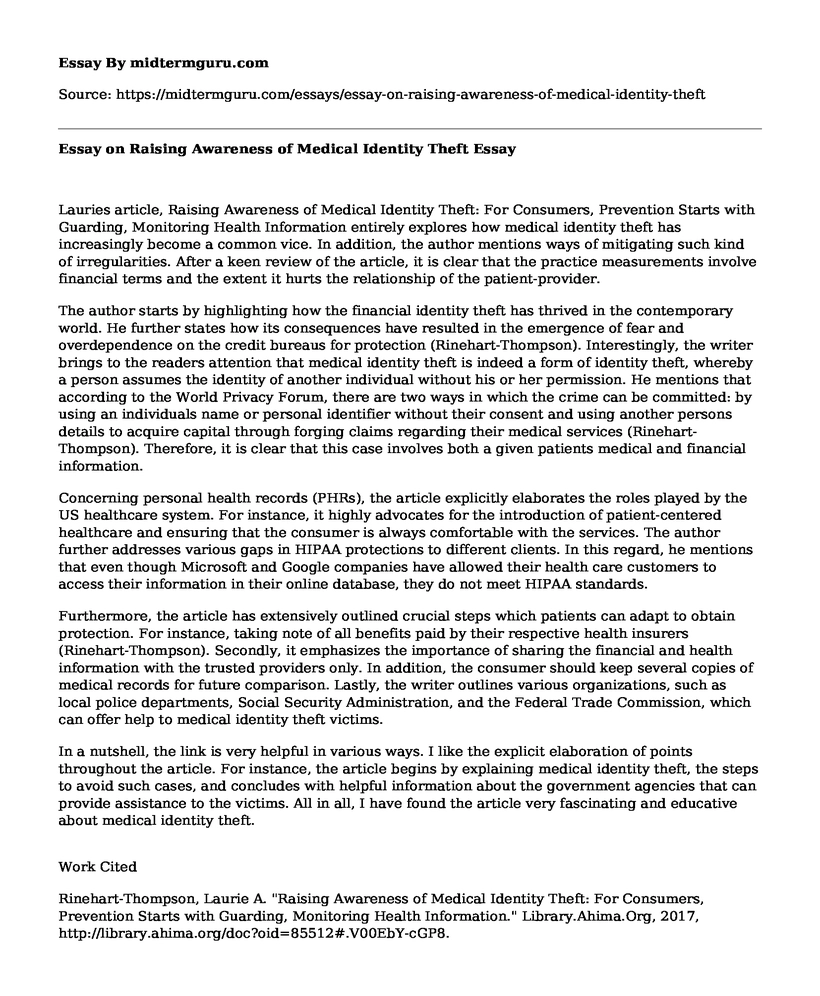Lauries article, Raising Awareness of Medical Identity Theft: For Consumers, Prevention Starts with Guarding, Monitoring Health Information entirely explores how medical identity theft has increasingly become a common vice. In addition, the author mentions ways of mitigating such kind of irregularities. After a keen review of the article, it is clear that the practice measurements involve financial terms and the extent it hurts the relationship of the patient-provider.
The author starts by highlighting how the financial identity theft has thrived in the contemporary world. He further states how its consequences have resulted in the emergence of fear and overdependence on the credit bureaus for protection (Rinehart-Thompson). Interestingly, the writer brings to the readers attention that medical identity theft is indeed a form of identity theft, whereby a person assumes the identity of another individual without his or her permission. He mentions that according to the World Privacy Forum, there are two ways in which the crime can be committed: by using an individuals name or personal identifier without their consent and using another persons details to acquire capital through forging claims regarding their medical services (Rinehart-Thompson). Therefore, it is clear that this case involves both a given patients medical and financial information.
Concerning personal health records (PHRs), the article explicitly elaborates the roles played by the US healthcare system. For instance, it highly advocates for the introduction of patient-centered healthcare and ensuring that the consumer is always comfortable with the services. The author further addresses various gaps in HIPAA protections to different clients. In this regard, he mentions that even though Microsoft and Google companies have allowed their health care customers to access their information in their online database, they do not meet HIPAA standards.
Furthermore, the article has extensively outlined crucial steps which patients can adapt to obtain protection. For instance, taking note of all benefits paid by their respective health insurers (Rinehart-Thompson). Secondly, it emphasizes the importance of sharing the financial and health information with the trusted providers only. In addition, the consumer should keep several copies of medical records for future comparison. Lastly, the writer outlines various organizations, such as local police departments, Social Security Administration, and the Federal Trade Commission, which can offer help to medical identity theft victims.
In a nutshell, the link is very helpful in various ways. I like the explicit elaboration of points throughout the article. For instance, the article begins by explaining medical identity theft, the steps to avoid such cases, and concludes with helpful information about the government agencies that can provide assistance to the victims. All in all, I have found the article very fascinating and educative about medical identity theft.
Work Cited
Rinehart-Thompson, Laurie A. "Raising Awareness of Medical Identity Theft: For Consumers, Prevention Starts with Guarding, Monitoring Health Information." Library.Ahima.Org, 2017, http://library.ahima.org/doc?oid=85512#.V00EbY-cGP8.
Cite this page
Essay on Raising Awareness of Medical Identity Theft. (2021, Jun 10). Retrieved from https://midtermguru.com/essays/essay-on-raising-awareness-of-medical-identity-theft
If you are the original author of this essay and no longer wish to have it published on the midtermguru.com website, please click below to request its removal:
- Applying the Theory of Cybercrime to Hacking for Fun
- Special Education Court Case - Law Paper Example
- Paper Example on Class Distinction and Human Rights
- Essay Sample on Research in Criminal Justice
- Human Memory and Criminal Justice: Examining Potential Errors - Essay Sample
- Law Enforcement Agents: The Forefront of Illicit Integrity Trends - Essay Sample
- Katherine Knight: The Worst Female Murderer in Australian History - Essay Sample







